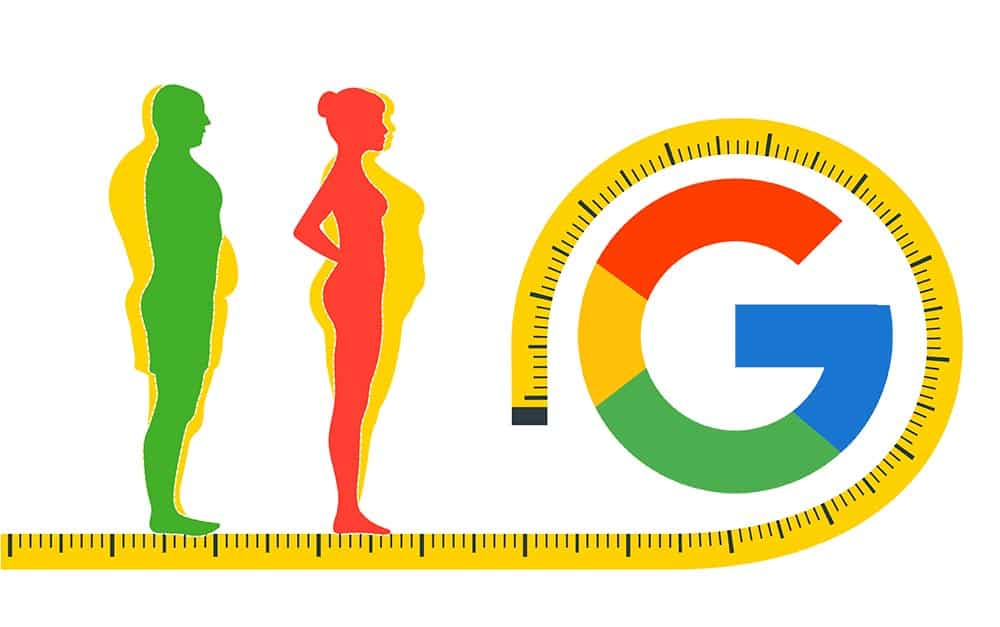How To Add Authority To Your Website For YMYL Topics Instantly
If you search the web for ways to improve authority on YMYL (Your Money, Your Life) topics, the top results are various blogs that focus on SEO advice. The majority of these blogs take a marketer’s approach to website authority, emphasizing the addition of bios and including information on why that person is an authority.
While these additions are considered best practices for providing audiences transparent information, the single most important thing forgotten is how the content of your site is actually evaluated by Google’s crawlers (Googlebot) … not a human.
YMYL topics have become an increasingly popular topic regarding Google’s recent Core Algorithm updates. Unfortunately, much of the advice for publishers is subjective and not overly actionable.
Below, I’ll take you through the fastest ways to add authoritativeness to your website for YMYL topics. I’ll take an objective approach that uses real data instead of information from marketers that treat Google as if it is a human subjectively reading the content on every website.
What are the fastest ways to improve website authority on a topic?
The first way to improve website authority is to analyze your own content the same way Google does. While not the easiest thing in the world to do, we can get close using Google’s own Natural Language Cloud.
Google’s Natural Language sample tool allows anyone to easily view their content through the lens of a machine. This is how a machine can theoretically “read” your content, derive meaning from it, and figure out what the main categories and concepts are within the content itself.
I’ll use an article from Healthline.com on the ketogenic diet to demonstrate how Google’s Natural Language tool analyzes the content on a site. The first thing Google is going to do is pull out entities from the content: people, places, things, and ideas.
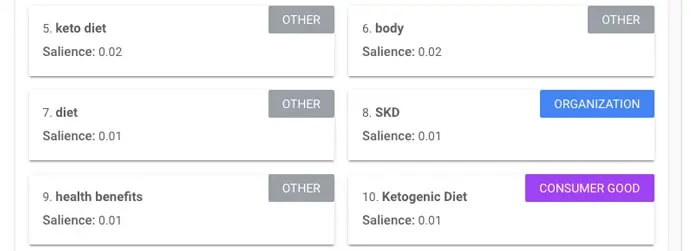
You can see how it ranks the frequency of these main ideas and is accompanied by their salience. The tool also looks at the sentiment, which is how much of this information is dense, positive, or negative.
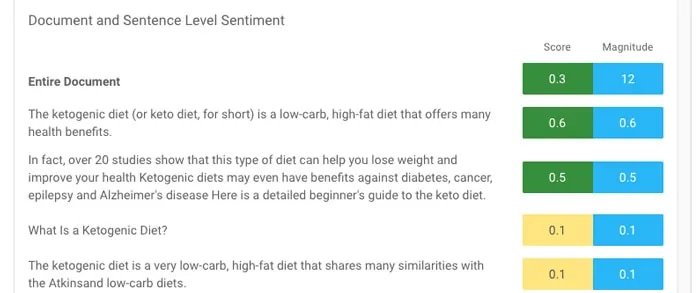
We can also view how Google interprets the syntax and how words relate to one another within the content.
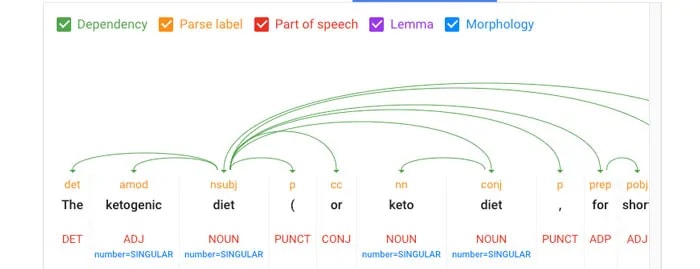
Google can look at the article and find what parts are the most important. These items (the categories tabs) are the items that are most likely to be searched, and these machines are actually really great at reading content and being able to pull meaning from it.

While Google hasn’t shared that Google Cloud’s Natural Language tools are rolled into RankBrain, or any part of their search algorithm for that matter, we do know that Google is using machines to read and understand the context of both the publisher’s content and the searcher’s initial query.
Using these tools, publishers could test their content to see exactly how Google’s own tools are parsing through and reading the content. It may not be exactly how Google is understanding the content in the context of search but it is an objective way to see how well content aligns with the queries in a publisher’s desired category.
Is my YMYL content really about YMYL?
Why this first piece of advice is paramount to web publishers trying to increase the authority on their YMYL sites is because this tool can help you make sure your content is about what you think it’s about.
If so, what sentences are machines reading that they find to be the most important?
Regarding syntax, is the content making claims?
Is this opinion or fact?
How is the information being structured?
When the machine is looking at different parts of my content, what is it extracting that it sees as significant parts of the langauge?
This type of information as a publisher can give you a more holistic view of your content through the lens of how it’s actually interpreted by Google’s crawler.
Even if Google takes all of that content in, the other thing it can look at is to determine whether an information source is an authority is where the content is linking to.
Google’s crawler may be seeking to find, “Where is the source getting this information from?”
This brings me to my second fast way to improve website authority on YMYL topics.
Look at what third-party sources your content is linking to. A quick Google search will show you which sites its crawler thinks have the most authority.
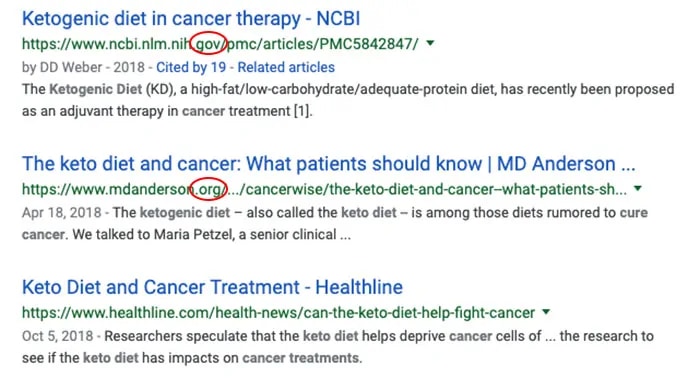
Here are the search results for “ketogenic diet cancer cure.” The top two out of three results are .gov and .org pages. The majority of the first-page search results yield the same types of sites. So if you’re not a doctor, scholar, or government agency, don’t worry. Because if you run a site that blogs about the health benefits of keto, or something else within the YMYL space, it’s still possible to add authority to your YMYL topics.
Google wants to know where you’re getting your information from. Even if you have sound advice on the topic, and you internally link between other pages on your site, have lots of good content, and you explain the concepts and ideas behind your content, it is still important to link to credible sources.
If you write about YMYL topics, being able to link out to a research study or academic journal is particularly helpful, especially if those sources are .gov, .org, or .edu. Healthline.com is a good example of a non-academic, non-governmental source that follows the advice of linking to credible sources. Within the first paragraph of an article, they already link to four.
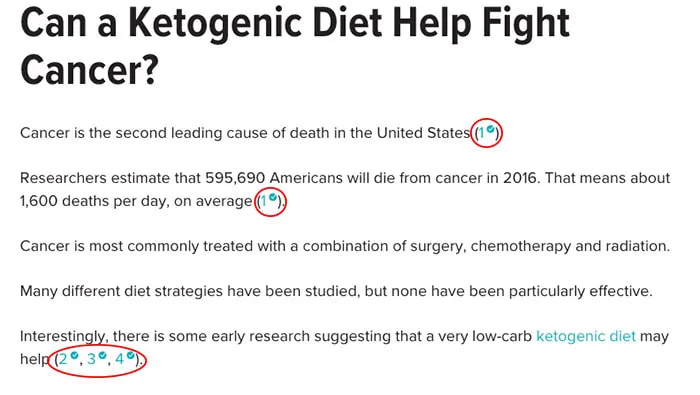
Another tip to add authority to your content is making follow links. “Follow” means Google’s crawler will be able to hit the link and see where it goes. If publishers set links to no-follow by default, the crawler will not be able to see where the link goes.
GOOD ADVICE: There is a stigma among publishers that too many external links are a bad thing, but without them, your content will not be crawlable. But if you’re adding external links, you should always make them follow. The only time you should use no-follow links are for affiliate links.
UPDATE: Affiliate links should be changed to rel=sponsored like Google wants before March 1, 2020, instead of rel=nofollow like has been done in the past.

What are YMYL websites?
YMYL stands for “Your Money, Your Life.” The most common types of sites that fall into these categories are medical, personal finance, and healthy lifestyle space. YMYL really became popular when Google updated its guidelines right before the big medic update.
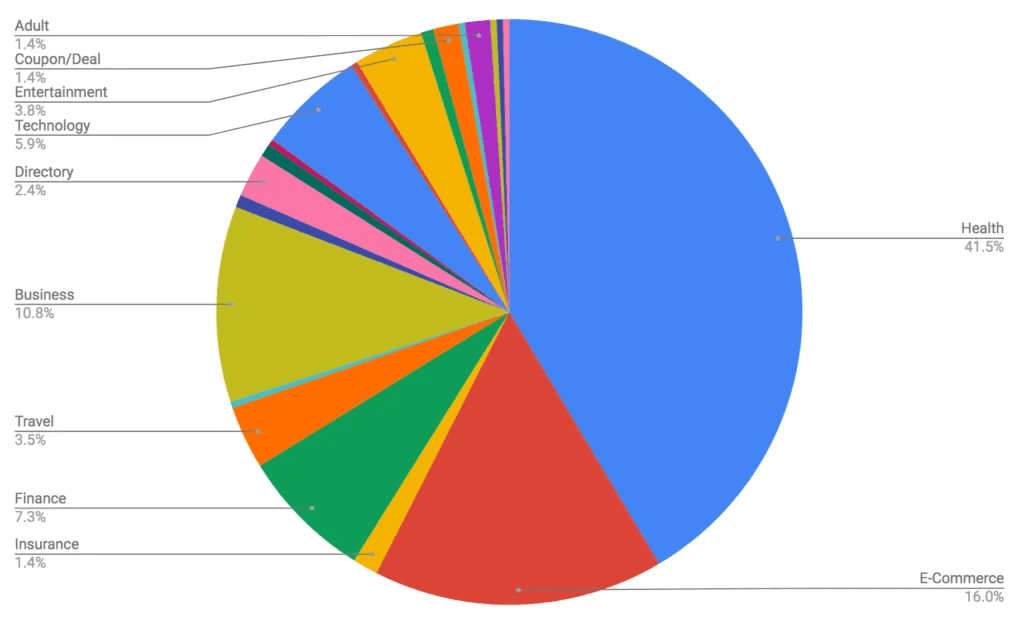
What was the Google Medic update?
The Google Medic update was a part of Google’s Core Algorithm Update in August of 2018. Sites that fall into the “Your Money, Your Life” categories on Google’s manual raters guideline seemed to be the most heavily affected by the update.
Blogs and informational sites that offer perspectives that could adversely affect a person’s money or health seems to have seen the most movement in results. It was dubbed as the “Google Medic Update” by popular SEO reporter, Barry Schwartz.
What are the SEO ranking factors for YMYL?
The potential SEO ranking factors for YMYL are:
- What other things are you linking to on your page?
- In terms of the content you’re providing, is the content truly about the topics you intended?
- Does the content answer the questions people might have?
- Do you have lots of affiliate links on these pages? Google can see if you’re making claims and linking out to a product and whether you’re being transparent about the relationship.
- Are ads, affiliate links, or sponsored content distinct from the main content of the page? Ad content disguised as main content will rank a site significantly lower.
While writer biographies, About Us pages, and details in the Contact Us portions of a publisher’s site can be important, these types of activities are not likely the deciding factors in how Google chooses to rank a YMYL site. These factors tell a great story, but do not really lend themselves to the way a web crawler, like Googlebot, behaves.
What is E-A-T?
E-A-T stands for Expertise, Authoritativeness, and Trustworthiness. All of these terms can be boiled down into a single question: is the person writing this credible?
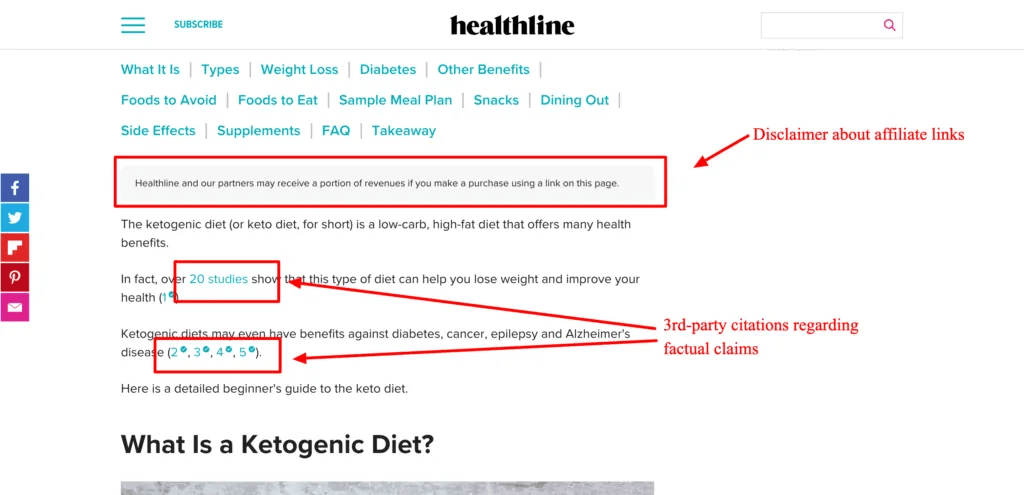
Here is how a machine can determine the E-A-T of a website.
Expertise: Does this ‘expert’ cite information? Is the site generally a source that talks about this topic often? Is the author on the site published writing about other topics like this elsewhere on the web? Google’s crawler can see what other posts an author has written.
Authoritativeness: Where is this information coming from? Does the site consistently talk about the same topic? If this isn’t the case, is the site citing this in links that Googlebot can follow?
Trustworthiness: What is the site’s record? Has it been on the internet long? What types of sites does it link to? If you’re a new site, and you don’t have any other authoritative sites linking back to you, you will rank lower than a more established site that’s been around longer.
Why do many “experts” confuse E-A-T and YMYL concepts?
These “experts” confuse E-A-T and YMYL concepts because they are operating under the presumption that a real person is evaluating the person writing the content and will determine, “This person is or isn’t actually an expert on the topic.”
That is not at all how Googlebot and Google’s algorithm is likely going to evaluate it. Google is trying to look at content and see if the author is writing about similar topics on its site, citing their information, and where the information is coming from, and then it will try to create a complete picture about the site is as a whole prior to ranking individual pages on specific YMYL queries.
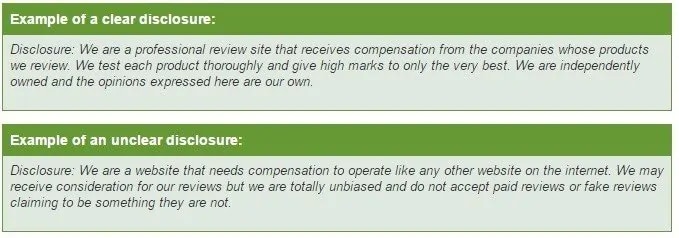
How can websites improve E-A-T (eating)?
Websites can improve E-A-T by:
- Using cloud natural language to determine concepts, categories, syntax, etc. and improving their content to better align with potential expectations of searchers looking for objective information on these topics.
- Fully disclosing any affiliate links or sponsored content on the page and highlighting why a particular brand or product may be featured.
- Having an author’s bio at the bottom of your page, and if you can link out to any certification you have or additional credibility. For example, I may link to my university’s degree program. When I’m talking about the author, being able to link to the university will solidify the relationship between those two things.
What do webmaster rater guidelines have to do with site authority?
The Google webmaster rater guidelines provide us a rubric in terms of what criteria Google is evaluating itself on, in terms of how it’s trying to evaluate these sites. Google is using manual raters to A/B test different search results against each other, and then the manual raters use those guidelines to give feedback to Google on which search results they thought were better. Google uses quality raters to determine whether or not the changes they are making to the algorithm are good or bad for the user.
What’s important to remember is that these guidelines exist so Google can internally test things. These guidelines are not being rolled into actual search algorithm results; however, the rater guidelines serve as a good thing for publishers to read in terms of best practices. And with these guidelines, they can tell us a lot about how Google may be turning the dials on their algorithms to determine how they want to make changes.
So, do you want to align the way you build your content and your website to these guidelines? Of course, but these guidelines are not specific ranking factors in terms of no person is manually looking at your site to see if it has any authority. Again, your content is interpreted by Google’s web crawler.
How do you improve website authority?
- Use citations to point Google’s crawler to where you got the information.
- Evaluate your content holistically regarding any claims you’re making.
- Disclose third-party relationships.
- Create internal linking between your content on similar topics.
Also, if you have other topics on that subject you’ve written about, make sure that your author pages are something that’s linkable. So if someone clicks on the author name, the crawler can see that you have written many different blogs on the same topics. Sites that use generic accounts or admin accounts will suffer when Google crawls that information.
How long until a site can recover from poor E-A-T?
There’s no way of knowing if you’ve been affected by poor E-A-T. If you’ve seen a drop in rankings, realize that the majority of sites that see a drop in organic traffic is because of something they have done by accident or on purpose, not understanding that it was going to negatively impact them. The chances of someone actually being affected by a ranking algorithm are pretty slim. And generally, you know about it, because of changes like the Google Medic update.
If you are in one of these YMYL categories, and you think this is something that could be negatively impacting your site, focus on the actions we talked about above. Google is reactive. If you make these changes, you can expect to see improvements with a few weeks at the very minimum.
If you make these changes and you don’t see recovery, it doesn’t have anything to do with poor E-A-T, and you should look into other aspects of your site. It could have to do with top-level authoritativeness within your subjects. You may want to focus on long-tail versions of the same types of terms
How can I improve my search ranking as a YMYL site?
You can still write better content than the sites with traditional authoritativeness in the eyes of Google’s crawler (.gov, .edu, .org).
These “credible” sources may not really satisfy the needs of the user in terms of looking for info on a ketogenic diet as a cure for cancer, to use an earlier example. Even if you aren’t an authority on these topics, you can cite them.
Structure your content by answering the right questions that some of these more research-based, templated, and structured information that might not answer a user’s question in a more efficient way.
More questions about YMYL, Google’s recent Core update, or EAT? Leave them below and I’ll answer them.
